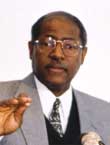Spring 2000
Building Road Maps for Reporters
By Pat Ford
Staff Writer, Pew Center
Experts on sprawl and race relations identified a series of challenges for journalists who delve into a new series of polls by the Pew Center. The polls reveal dramatic frustrations over sprawl and growth now edging out more traditional local issues, such as crime.
Moreover, the polls found stark differences in how minority and white respondents viewed the fairness of treatment by local institutions. The findings are based on a national survey of 1,000 people and four regional surveys of 500 people each in Denver, Philadelphia, San Francisco and Tampa.

“This poll is an affirmation of enormous changes that are happening out there in the American landscape that need to be understood at a much deeper level,” said Bruce Katz, a national sprawl expert and director of The Brookings Institution’s Center on Urban and Metropolitan Policy.
Ron Walters, distinguished leadership scholar at the University of Maryland’s James MacGregor Burns Academy of Leadership and an expert in African American political involvement, told reporters they must dig deeper into issues and communities to get a better picture of the concerns revealed in the poll.
The polls found that although a majority of respondents felt such institutions as government, schools, police and the news media were fair to all, regardless of race, a significant majority of African Americans and other minorities perceived that they were unfairly treated.
Katz called for more hard-hitting reporting on sprawl:
Katz said the media have reported many of the benefits of the new economy but have not looked at the consequences of many new technology companies locating in outer suburbs. He also noted there has been little coverage of the dramatic impact of race, class and ethnicity on growth patterns.
The media have focused much attention on the traffic and congestion caused by sprawl, Katz said, but have given less attention to such issues as the loss of open space, environmental degradation and the cost of growth to taxpayers.
The poll shows that people have recognized that government policy impacts sprawl. The next step, Katz said, is to begin covering public policy decisions in a new way – in a more metropolitan context.
“In terms of how we think about these issues, there is a lot of work to be done,” Katz said.

Similarly, Dr. Walters said the poll set a tough agenda for reporters trying to understand the perceptions of different subgroups. But he said it was important to report those differences because the top-line results of polls – showing majority opinions -are so starkly different from the results when they are broken down by race, gender and socio-economic class.
“Reporters often take the top-line analysis and run with it. That’s dangerous,” said Walters.
In a sobering finding for journalists, the Pew polls reveal more minorities perceived that they were treated unfairly by the news media than by the local police.
“Diversify. Legitimize the voices of the subgroups,” Walters advised. “We often take the voice of the majority, which is the authoritative voice of policy makers … and those are the voices who presume to fashion the solutions for people who are hurting. And the people who are hurting don’t get in the equation.
“If I got my foot on your neck and somebody asks you, ‘How much does it hurt?’ and I answer — something’s wrong,” he said.
Complete poll results are at www.pew center.org/doingcj/research/r-ST2000.html.
